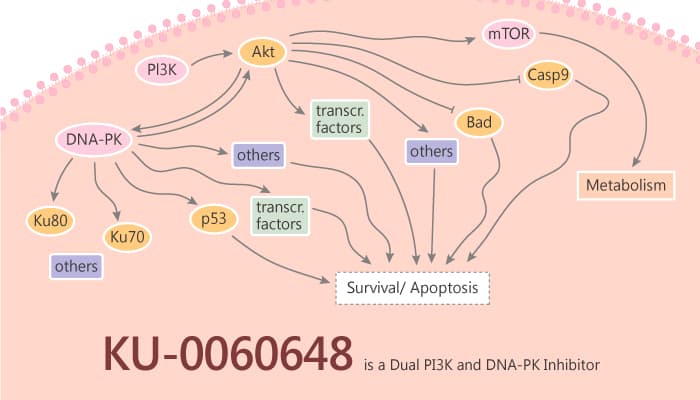DNA double-strand breaks (DSBs) are the principal cytotoxic lesions induced by topoisomerase II poisons. And DSB inhibitors are widely applied in the treatment of a variety of human solid malignancies and leukemia. Cells defective in DSB repair by virtue of the inactivation of a component of the NHEJ pathway are sensitive to ionizing radiation (IR) and topoisomerase II poisons. Conversely, over-expression of DNA-PKcs, a key component of the NHEJ pathway accelerates the repair of IR, etoposide and doxorubicin-induced DSBs. Previous studies demonstrated that DNA-PK inhibition represented an attractive approach for modulating resistance to therapeutically-induced DNA DSBs.A study from Joanne M. Munck identified KU-0060648 as a potent inhibitor of DNA-PK, which has >500-fold greater solubility, greater potency against DNA-PK. KU-0060648, a dual DNA-PK, and PI3K inhibitor show selectively over other PI-3K-like kinases, such as ATM, ATR, and mTOR.

In vitro, KU-0060648 inhibits cellular DNA-PK auto-phosphorylation with IC50 values of 0.019 μM (MCF7 cells) and 0.17 μM (SW620 cells), and PI-3K-mediated AKT phosphorylation with IC50 values of 0.039 μM (MCF7 cells) and >10 μM (SW620 cells).
Besides, KU-0060648 (30-500 nM; 72 hours) dose-dependently inhibits HepG2 cell proliferation, IC50=134.32nM.
KU-0060648 (0.1-1 μM; 5 days) inhibits cell lines growth with GI50s of 0.95 μM, 0.21 μM, 0.27 μM, 0.41 μM and 1 μM in SW620, LoVo, MCF7, T47D and MDA-MB-231 cells.
Moreover, KU-0060648 (100-300 nM; 12 hours) significantly inhibits activation of PI3K (p85 phosphorylation), AKT (Ser-473 and Thr-308 phosphorylations) and mTOR (p70S6K1 Thr-389 phosphorylation) in HepG2/Huh-7 lines and primary human HCC cells.
Furthermore, in vivo, KU-0060648 enhanced the anti-tumor activity of etoposide in both MCF7 and SW620 xenograft models. Again, KU-006064 has single-agent activity in the MCF7 xenograft model.
Another study from Min-Bin Chen verified KU-0060648 in preclinical hepatocellular carcinoma (HCC) models.
In vivo, KU-0060648 (intraperitoneal (i.p.)) significantly inhibited HepG2 xenograft growth in nude mice. Finally, the authors showed that KU-0060648 significantly upregulated DNA-PKcs expression in human HCC tissues. Yet miRNA-101, an anti-DNA-PKcs miRNA, was downregulated. Over-expression of miR-101 in HepG2 cells inhibited DNA-PKcs expression and cell proliferation.
To conclude, KU-0060648 is a dual inhibitor of PI3K and DNA-PK.
Reference: